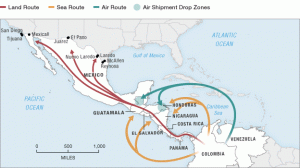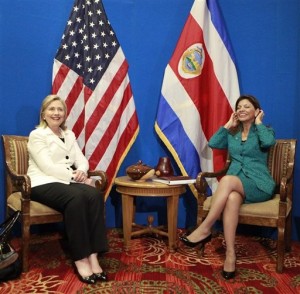The past three plus decades have been crucial for Central America. The 1980s were marked by long standing social inequalities and major political vulnerabilities that triggered civil wars in many parts of the isthmus. Central America became one of the frontlines of the conflict between the United States and the USSR. Later, external pressure and successive feats of political courage by Central American leaders, including lobbying from the business and academic sector brought a negotiated end to those conflicts and a transition process in which democratically elected governments replaced authoritarian regimes, some of them indescribably brutal. The result of these achievements was both optimism in the region’s development potential and a visible loss of interest on the part of external actors, particularly the United States. After being the Afghanistan of the 1980s, Central America essentially dropped off the U.S. radar screen for the past twenty years ( source: K. Casas, The Economist, CLADS and UN).
However, recently the region has made a comeback on the public policy scene but for all the wrong reasons. Today, Central America seems to be reverting back to its old ways. Three Central American countries—Honduras, Nicaragua and Guatemala—are facing serious political challenges that render the frailty of their democratic institutions all too apparent.
To many it would appear that Che Guevara’s dream of a socialist revolution is alive and well today in Latin America. More than forty years after the death of the defeated rebel, a pink tide of socialism is washing up on the shores of Central and South America. Yet, despite El Che’s predictions of rebellious insurrection, more than a handful of left leaning Latin leaders have been elected into power without even getting their hands dirty. Nicaragua’s Daniel Ortega, Honduran “Mel” Zelaya and more recently, El Salvador’s Mauricio Funes are all proof of Central America’s shift to the left. In South America, Rafael Correa, Evo Morales and Cristina Kirchner have aligned themselves with leftist policies as well. And last, but never least, Venezuelan President Hugo Chavez, the reddest element in this pink tide, is trumpeting these victories as the economic and political successes of “21st century socialism.”
The economic instability in the region provides fertile ground for this pink tide to swell even further, engulfing our fragile democracies, threatening burgeoning economies and underscoring the fact that the region’s collective fate is tied to a robust global economy. If foreign economies continue to falter, multinationals will no longer be in a position to invest in Latin America, leaving it even more vulnerable than ever. As currencies weaken, poverty and inequality abound and become feeding grounds for the rise of populist leaders whose empty promises provide no real solutions to the problems at hand. As these demagogues gain power over the masses, the opportunity to attract foreign investment diminishes, causing the vicious cycle of our history to repeat itself.
This is inextricably related to the persistence of old and unmet development democratic and governance challenges, as well as to the emergence of complex new ones. Current political travails in some Central American countries are here to stay, unless we attack them strategically. As has happened before, Central America, too close to the United States to be ignored, may yet find a way onto the crowded radar of the White House, as suggested by President Obama’s visit to El Salvador in March of the 2011 In addition, the Central American security summit held in Guatemala City in June of the 2011 addressed the shared responsibility of drug-consuming countries, such as the United States, in solving the region’s security crisis. But unfortunately, the meeting yielded relatively little in the way of fresh funds to combat the issues.
Moreover, educational dropout rates and inequality in schooling are gaining field among Central American countries. This prepares the field for a macroeconomic unsustainable arena that will affect the competitiveness, foreign direct investment, rule of law, and the enforcement of public policies. These realities impede development and continue to make the region prone to political crises and democratic reversals. These issues require a well defined strategy that starts with prevention by creating legal frameworks and public policy that keeps our children in school.
Without an efficient legal, political framework and adequate public policies to foster our economies and support the business and public sector dependence on foreign economies will be our end. What we need is prepared human capital ready to work on behalf of their countries.
The best and brightest tend to work in the private sector, leaving a dearth of qualified individuals in positions that can define our collective destiny.
The proposed Road Map
First, there have to be a newly designed incentives and the due process of law and transparency for the public officer applicants. Second, the teachers in public affairs, public administration and law schools have to be as prepared as possible and understand the needs of the country and the issues that we have at this particular point in time. As well the core curricula of the schools must be designed in accordance with the issues in strategic partnership with the government institutions. Third, the human capital who wants to work on such challenged has to be supported to study abroad with scholarships that will provide them with the means to garner the best education.
The institutional capacity of the region is weak, and there is a need for committed and passionate professionals who are not driven by money, but by the welfare of our collective future. That is the main reason why I’m here at the MPA program to learn how to mitigate this issues that are affecting our Foreign Direct Investment, growth opportunities, sustainability as a region and above all our democracies .



